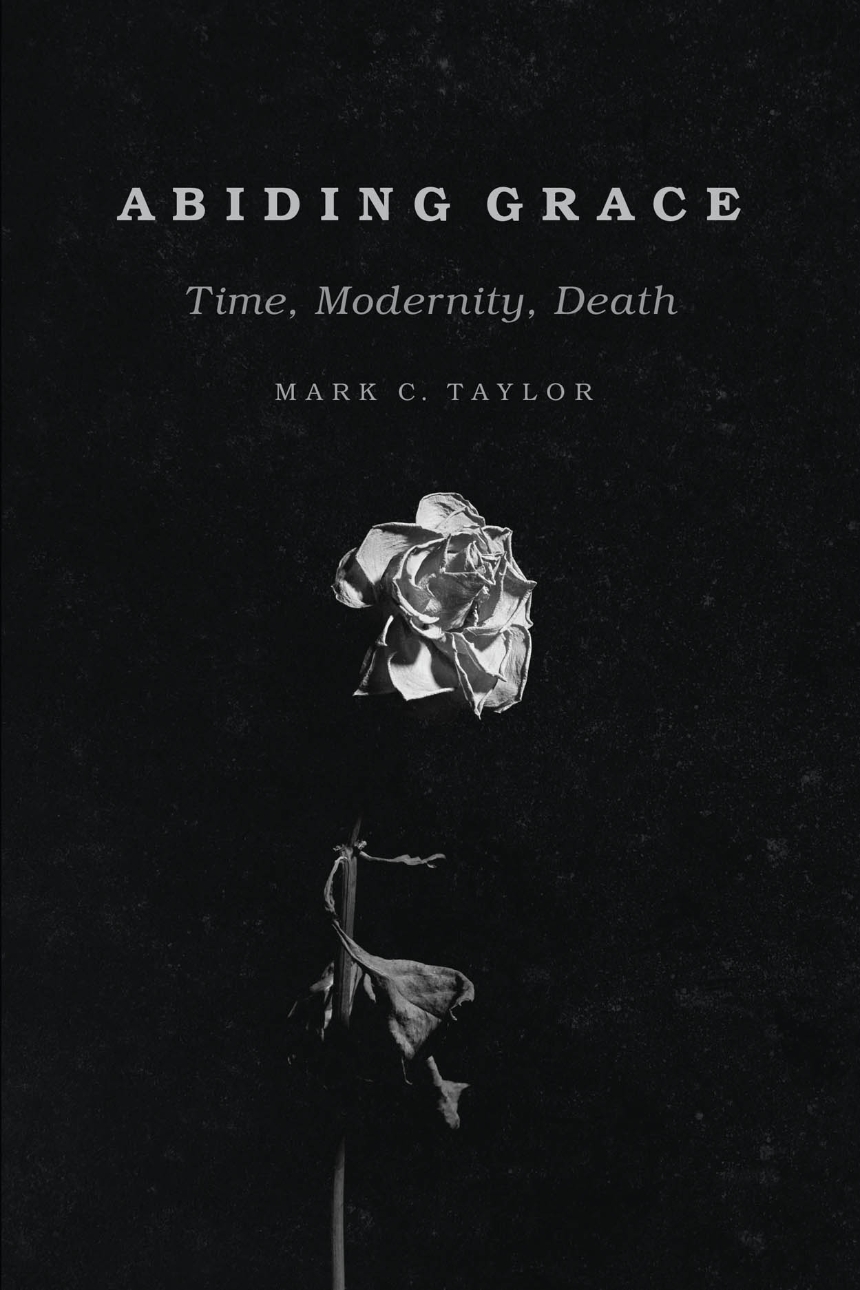Abiding Grace
Time, Modernity, Death
Post-war, post-industrialism, post-religion, post-truth, post-biological, post-human, post-modern. What succeeds the post- age? Mark C. Taylor returns here to some of his central philosophical preoccupations and asks: What comes after the end?
Abiding Grace navigates the competing Hegelian and Kierkegaardian trajectories born out of the Reformation and finds Taylor arguing from spaces in between, showing how both narratives have shaped recent philosophy and culture. For Hegel, Luther’s internalization of faith anticipated the modern principle of autonomy, which reached its fullest expression in speculative philosophy. The closure of the Hegelian system still endures in the twenty-first century in consumer society, financial capitalism, and virtual culture. For Kierkegaard, by contrast, Luther’s God remains radically transcendent, while finite human beings and their world remain fully dependent. From this insight, Heidegger and Derrida developed an alternative view of time in which a radically open future breaks into the present to transform the past, demonstrating that, far from autonomous, life is a gift from an Other that can never be known.
Offering an alternative genealogy of deconstruction that traces its pedigree back to readings of Paul by way of Luther, Abiding Grace presents a thoroughgoing critique of modernity and postmodernity’s will to power and mastery. In this new philosophical and theological vision, history is not over and the future remains endlessly open.
Abiding Grace navigates the competing Hegelian and Kierkegaardian trajectories born out of the Reformation and finds Taylor arguing from spaces in between, showing how both narratives have shaped recent philosophy and culture. For Hegel, Luther’s internalization of faith anticipated the modern principle of autonomy, which reached its fullest expression in speculative philosophy. The closure of the Hegelian system still endures in the twenty-first century in consumer society, financial capitalism, and virtual culture. For Kierkegaard, by contrast, Luther’s God remains radically transcendent, while finite human beings and their world remain fully dependent. From this insight, Heidegger and Derrida developed an alternative view of time in which a radically open future breaks into the present to transform the past, demonstrating that, far from autonomous, life is a gift from an Other that can never be known.
Offering an alternative genealogy of deconstruction that traces its pedigree back to readings of Paul by way of Luther, Abiding Grace presents a thoroughgoing critique of modernity and postmodernity’s will to power and mastery. In this new philosophical and theological vision, history is not over and the future remains endlessly open.
304 pages | 3 halftones, 21 line drawings, 2 tables | 6 x 9 | © 2018
History: History of Ideas
Philosophy: Philosophy of Religion
Reviews
Table of Contents
List of Illustrations
List of Abbreviations
Acknowledgments
1. Ending (the) Series
Beginning Ending
Post Ages
Contretemps
Refiguring
2. Mirror Stage
Programming
Quest for Autonomy
3. Constructing Modernism-Postmodernism
From Speculation to Spectacle and Simulation
Self-Reflexive Technologies
Escaping Time
Time, Modernity, Death
4. Ghosts Haunting Modernism-Postmodernism
Reformation to Revolution
Hegel’s Luther
Kierkegaard’s Luther
Heidegger’s Luther
5. Recollecting the Future
Logos and Trinity
Spacing and Timing
Incarnation, Crucifixion, Resurrection
6. French Hegels
Between Reason and Unreason
Deferring Presence
End of History
Structure and Event
7. Being Timely
Unending
Coup de Grace
Being as Time
In-difference of Art
Art Opening
8. Abiding
Abiding Debt
Unpresentable
Shadow of Death
Being Given
Trembling
9. Ending Ending
Letting Go
Notes
Index
List of Abbreviations
Acknowledgments
1. Ending (the) Series
Beginning Ending
Post Ages
Contretemps
Refiguring
2. Mirror Stage
Programming
Quest for Autonomy
3. Constructing Modernism-Postmodernism
From Speculation to Spectacle and Simulation
Self-Reflexive Technologies
Escaping Time
Time, Modernity, Death
4. Ghosts Haunting Modernism-Postmodernism
Reformation to Revolution
Hegel’s Luther
Kierkegaard’s Luther
Heidegger’s Luther
5. Recollecting the Future
Logos and Trinity
Spacing and Timing
Incarnation, Crucifixion, Resurrection
6. French Hegels
Between Reason and Unreason
Deferring Presence
End of History
Structure and Event
7. Being Timely
Unending
Coup de Grace
Being as Time
In-difference of Art
Art Opening
8. Abiding
Abiding Debt
Unpresentable
Shadow of Death
Being Given
Trembling
9. Ending Ending
Letting Go
Notes
Index
